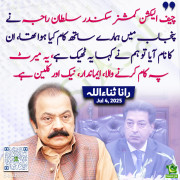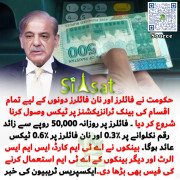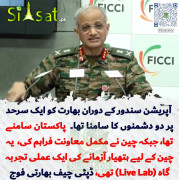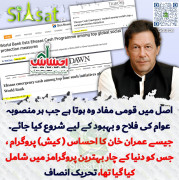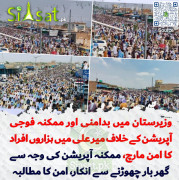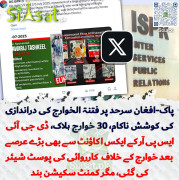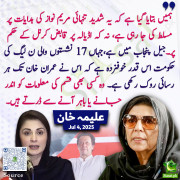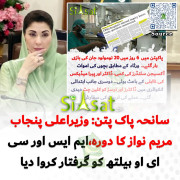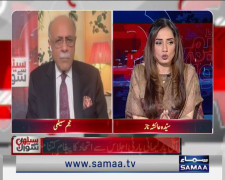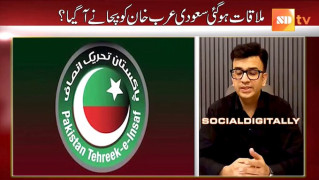S
Siasati
Guest
Imran and the 'liberals'
Saturday, September 12, 2009
Naeem ul Haque
There has been, for a number of years, a sustained criticism of Imran Khan for being "too close" to the religious parties, especially the Jamaat-e-Islami. Most of these critics come from an urban secular background. But this particular criticism of Imran is erroneous and carries little weight.
Perhaps their disappointment results from their false perception that Imran is moving towards a theocratic path espoused by parties like the Jamaat. Imran has also been called a mullah at heart and a closet fundamentalist by some cynics.
As perhaps the most articulate national political leader of the country and the most sought-after by the electronic media, Imran has been widely watched and micro-examined by political observers. His very limited association with the Jamaat leaves little doubt that most of this criticism has been grossly exaggerated, and when compared to the PPP's association with the JUI it pales in comparison.
As fellow members of APDM, the leaders of the PTI and the Jamaat have met a number of times. But there has been no further political cooperation and very little contact between party functionaries. The incident at Punjab University last year, if anything, increased the distance between the two parties. Imran has also openly opposed and criticised Jamaat's stand on the 17th Amendment. On an individual basis Imran has admired Qazi Husain Ahmed the former Amir of Jamaat as a person of character and immense courage. This admiration has been mutual.
On the political front, while Imran Khan was forcefully and openly advocating sovereignty as the basis of our foreign policy, he found little support amongst the main political forces of the country like the PPP, the MQM and the ANP, which saw subservience to Washington as the key to political success. The Jamaat was one of the very few political forces which endorsed this principle and joined Imran Khan in calling for opposing the American policies in Afghanistan.
Imran has never approached national issues from a theocratic point of view. He has sought to assert the importance of our religious and cultural heritage as a means to understanding and resolving many of our national issues, but advocates a completely modern and progressive approach on nation-building. Imran supports the adoption of successful economic, political and social models from all over the world, but is critical of many decadent western values.
Contrary to what many "liberals" believe, Imran is not a rightist. His views reflect a progressive "left of centre" slant on virtually all major issues. Imran is against feudalism and imperialism. Imran is a strong believer in the dignity of common man and considers the widening gap between the rich and the poor.
Imran believes in maximum provincial autonomy, more decentralisation and a strong Centre. To him it is the state's primary responsibility to ensure full and free provision of healthcare, education and welfare for all its people. Imran rejects the modern-day theorists who advocate increased dependence on the west as our way forward. He strongly believes in the philosophy of self- reliance.
Imran Khan believes that there is a strong coterie of the English-medium chattering classes which have found solace in cynical expressions of disdain about everything which is Pakistani. These are the people who stay away completely from the political process, yet indulge incessantly in confused outpourings about political issues. Their contact with the masses is virtually nonexistent and their pronouncements one-sided. Imran has often wondered if this is an extension of the colonial mindset.
Imran also rejects religious "extremism" and "fundamentalism" as a distortion of the true spirit of Islam. He believes that Islam truly encompasses the philosophy of tolerance and the pursuit of enquiry and interpretation. To him Iqbal is the true philosopher of Islam. Imran frequently recalls the golden age of Islam when the Muslims led the world in science, the arts and scholarship. He believes that we need to broaden the spirit of religious education in Pakistan by extending its approach to history, philosophy, the arts and sciences and other disciplines. Imran believes that such an approach could produce new generations in Pakistan who would do the country proud.
Imran believes that the vast majority of Pakistanis is neither liberal nor fundamentalist and the issues facing the country are so complex that a wider ideological spectrum is required to resolve them. Imran's own personality is reflective of the multiple aspects of a strong family background, foreign education, a rediscovery of Islam in his early forties, high accomplishments nationally and internationally. He is perfectly at ease at prestigious international forums as well as in interaction with religious figures at home. He has friends amongst the very poor and the very rich. Imran's life has been enriched by enormous success and adversity, by hard work and struggle. The immense diversity of his experience has enabled to him to develop a comprehensive view of our society and the world at large and remains the basis of his decision to dedicate his life for a better Pakistan.
Saturday, September 12, 2009
Naeem ul Haque
There has been, for a number of years, a sustained criticism of Imran Khan for being "too close" to the religious parties, especially the Jamaat-e-Islami. Most of these critics come from an urban secular background. But this particular criticism of Imran is erroneous and carries little weight.
Perhaps their disappointment results from their false perception that Imran is moving towards a theocratic path espoused by parties like the Jamaat. Imran has also been called a mullah at heart and a closet fundamentalist by some cynics.
As perhaps the most articulate national political leader of the country and the most sought-after by the electronic media, Imran has been widely watched and micro-examined by political observers. His very limited association with the Jamaat leaves little doubt that most of this criticism has been grossly exaggerated, and when compared to the PPP's association with the JUI it pales in comparison.
As fellow members of APDM, the leaders of the PTI and the Jamaat have met a number of times. But there has been no further political cooperation and very little contact between party functionaries. The incident at Punjab University last year, if anything, increased the distance between the two parties. Imran has also openly opposed and criticised Jamaat's stand on the 17th Amendment. On an individual basis Imran has admired Qazi Husain Ahmed the former Amir of Jamaat as a person of character and immense courage. This admiration has been mutual.
On the political front, while Imran Khan was forcefully and openly advocating sovereignty as the basis of our foreign policy, he found little support amongst the main political forces of the country like the PPP, the MQM and the ANP, which saw subservience to Washington as the key to political success. The Jamaat was one of the very few political forces which endorsed this principle and joined Imran Khan in calling for opposing the American policies in Afghanistan.
Imran has never approached national issues from a theocratic point of view. He has sought to assert the importance of our religious and cultural heritage as a means to understanding and resolving many of our national issues, but advocates a completely modern and progressive approach on nation-building. Imran supports the adoption of successful economic, political and social models from all over the world, but is critical of many decadent western values.
Contrary to what many "liberals" believe, Imran is not a rightist. His views reflect a progressive "left of centre" slant on virtually all major issues. Imran is against feudalism and imperialism. Imran is a strong believer in the dignity of common man and considers the widening gap between the rich and the poor.
Imran believes in maximum provincial autonomy, more decentralisation and a strong Centre. To him it is the state's primary responsibility to ensure full and free provision of healthcare, education and welfare for all its people. Imran rejects the modern-day theorists who advocate increased dependence on the west as our way forward. He strongly believes in the philosophy of self- reliance.
Imran Khan believes that there is a strong coterie of the English-medium chattering classes which have found solace in cynical expressions of disdain about everything which is Pakistani. These are the people who stay away completely from the political process, yet indulge incessantly in confused outpourings about political issues. Their contact with the masses is virtually nonexistent and their pronouncements one-sided. Imran has often wondered if this is an extension of the colonial mindset.
Imran also rejects religious "extremism" and "fundamentalism" as a distortion of the true spirit of Islam. He believes that Islam truly encompasses the philosophy of tolerance and the pursuit of enquiry and interpretation. To him Iqbal is the true philosopher of Islam. Imran frequently recalls the golden age of Islam when the Muslims led the world in science, the arts and scholarship. He believes that we need to broaden the spirit of religious education in Pakistan by extending its approach to history, philosophy, the arts and sciences and other disciplines. Imran believes that such an approach could produce new generations in Pakistan who would do the country proud.
Imran believes that the vast majority of Pakistanis is neither liberal nor fundamentalist and the issues facing the country are so complex that a wider ideological spectrum is required to resolve them. Imran's own personality is reflective of the multiple aspects of a strong family background, foreign education, a rediscovery of Islam in his early forties, high accomplishments nationally and internationally. He is perfectly at ease at prestigious international forums as well as in interaction with religious figures at home. He has friends amongst the very poor and the very rich. Imran's life has been enriched by enormous success and adversity, by hard work and struggle. The immense diversity of his experience has enabled to him to develop a comprehensive view of our society and the world at large and remains the basis of his decision to dedicate his life for a better Pakistan.

